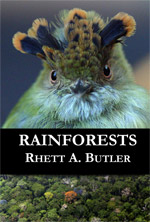
|
 |
|
|
Human rights key to rainforest conservation, argues reportmongabay.comSeptember 06, 2012
The report, published Wednesday and titled Rights-based rainforest protection, reviews the current status of tropical forests and the people who inhabit them, highlighting a series of examples where forest people are responsibly managing forest resources. The report makes the case that past approaches based on exclusion of forest people from their traditional lands won't work, nor will business-as-usual whereby large tracts of forest are granted to corporations for logging, mining, industrial agriculture, and conversion for palm oil or paper production. "In the part, the mainstream approach to forest conservation has been to exclude people living in the forest from decision making, and in many cases expel them from the forest. The economic perspective on forest management has been to maximize the short term exploitation of its resources – again at the expense of the rainforest communities," Lars Løvold, director of Rainforest Foundation Norway, said in a statement. "By making human rights the cornerstone of forest management strategies, we can achieve both long term protection of forest and secure the livelihood and development needs of some of the worlds' most vulnerable peoples." The report argues that human rights needs to be at the center of forest conservation efforts like the REDD+ (Reducing Emissions from Deforestation and Degradation) program. Secure land tenure, real participation, conflict resolution, and Free Prior Informed Consent (FPIC) play a central role in ensuring that basic rights of forest people are respected. The report says governments and consumers need to do more to protect forests from the entities that destroy them. "We all know that as a global community it’s more costly to destroy the rainforest than paying the prize to protect it. Still, today, the real money is made by those who exploit the rainforest for its resources, timber, palm oil, minerals and such, with large scale destruction as a result," said Løvold. "While a change of policy in rainforest countries is necessary, all countries have to take the responsibility of preventing their companies from investing in rainforest destruction, and by sharing the bill for the global ecosystem services the rainforest provide."
Related articles
Tags: green environment forest people indigenous rights rainforest people conservation indigenous people rainforests forests human rights saving rainforests community-based conservation redd and communities redd Environmental news index | RSS | News Feed | Twitter | Home Advertisements:
 T-shirts, shopping bags, calendars, and more.
|
|
|
WEEKLY NEWSLETTER RECENT FEATURES
POPULAR PAGES DONATE If you are interested in supporting our independent reporting on forest issues, our education initiatives, or other activities, please visit mongabay.org for more information. PHOTOS
BOOKS BY MONGABAY AUTHORS
FREE WEEKLY NEWSLETTER 
HIGH RESOLUTION PHOTOS / PRINTS 
|
| |
|
Copyright mongabay 2010 Carbon dioxide (CO2) emissions generated from mongabay.com operations (server, data transfer, travel) are mitigated through an association with Anthrotect, an organization working with Afro-indigenous and Embera communities to protect forests in Colombia's Darien region. Anthrotect is protecting the habitat of mongabay's mascot: the scale-crested pygmy tyrant. |

















